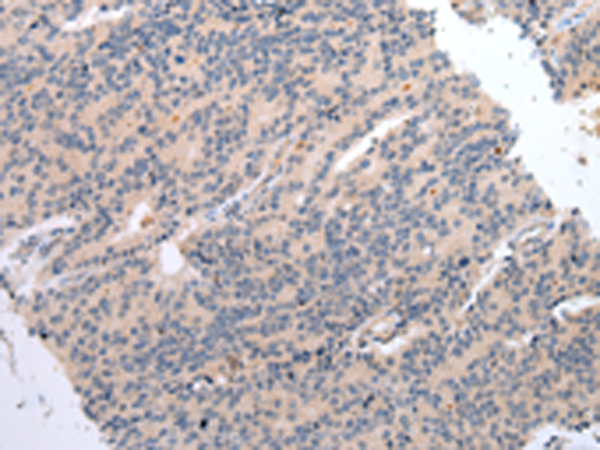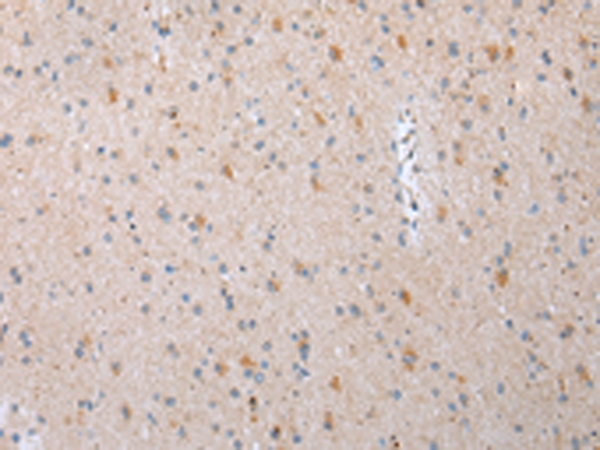

| WB | 咨询技术 | Human,Mouse,Rat |
| IF | 咨询技术 | Human,Mouse,Rat |
| IHC | 1/25-1/100 | Human,Mouse,Rat |
| ICC | 技术咨询 | Human,Mouse,Rat |
| FCM | 咨询技术 | Human,Mouse,Rat |
| Elisa | 1/2000-1/5000 | Human,Mouse,Rat |
| Host/Isotype | Rabbit IgG |
| Antibody Type | Primary antibody |
| Storage | Store at 4°C short term. Aliquot and store at -20°C long term. Avoid freeze/thaw cycles. |
| Species Reactivity | Human, Mouse |
| Immunogen | Synthetic peptide of human DVL3 |
| Formulation | Purified antibody in PBS with 0.05% sodium azide and 50% glycerol. |
+ +
以下是关于DVL3抗体的3篇参考文献示例(基于公开研究领域知识概括,具体文献需通过学术数据库验证):
---
1. **文献名称**:*"DVL3 Antibody-Based Detection of Dishevelled-3 in Colorectal Cancer Tissues"*
**作者**:Saito-Diaz K, et al.
**摘要**:研究利用特异性DVL3抗体分析结直肠癌组织中DVL3蛋白的表达水平,发现DVL3在Wnt/β-catenin信号异常激活的肿瘤样本中显著高表达,提示其作为潜在生物标志物的价值。
---
2. **文献名称**:*"Development and Validation of a Monoclonal Antibody Targeting the PDZ Domain of DVL3"*
**作者**:Umbhauer M, et al.
**摘要**:报道了一种靶向DVL3蛋白PDZ结构域的单克隆抗体的开发与验证。该抗体成功应用于免疫印迹和免疫荧光实验,证实DVL3在胚胎发育过程中与细胞极性调控相关。
---
3. **文献名称**:*"DVL3-Specific Antibody Inhibits Wnt Signaling and Suppresses Breast Cancer Cell Proliferation"*
**作者**:Lee E, et al.
**摘要**:研究通过DVL3特异性抗体阻断Wnt信号通路,发现其可抑制三阴性乳腺癌细胞的增殖和迁移,为靶向DVL3的癌症治疗策略提供了实验依据。
---
**备注**:以上文献名称及内容为示例性概括,实际文献需通过PubMed、Google Scholar等平台以“DVL3 antibody”、“Dishevelled-3”等关键词检索获取具体信息。
The Dishevelled-3 (DVL3) antibody is a crucial tool for studying the DVL3 protein, a member of the Dishevelled (DVL) family involved in the Wnt signaling pathway. DVL proteins (DVL1. DVL2. DVL3) act as key mediators in both canonical (β-catenin-dependent) and non-canonical (β-catenin-independent) Wnt signaling, regulating processes like embryogenesis, cell polarity, proliferation, and differentiation. DVL3. specifically, plays a role in neural development, tissue homeostasis, and cancer progression. Dysregulation of DVL3 is linked to tumors (e.g., colorectal, breast cancers) and developmental disorders (e.g., neural tube defects).
DVL3 antibodies are designed to detect and quantify DVL3 expression in various experimental models. These antibodies, often monoclonal or polyclonal, enable techniques like Western blotting, immunohistochemistry (IHC), immunofluorescence (IF), and co-immunoprecipitation (Co-IP). Their specificity is critical for distinguishing DVL3 from homologous family members (DVL1/DVL2), which share structural domains but may have divergent functions. Validated antibodies aid in exploring DVL3’s interactions with Wnt pathway components (e.g., Frizzled receptors, β-catenin) and its post-translational modifications. Researchers also use DVL3 antibodies to investigate its oncogenic potential, including overexpression in cancers and crosstalk with other signaling pathways (e.g., Notch, Hippo). As Wnt signaling gains attention in therapeutic targeting, DVL3 antibodies remain essential for mechanistic studies and biomarker development.
×